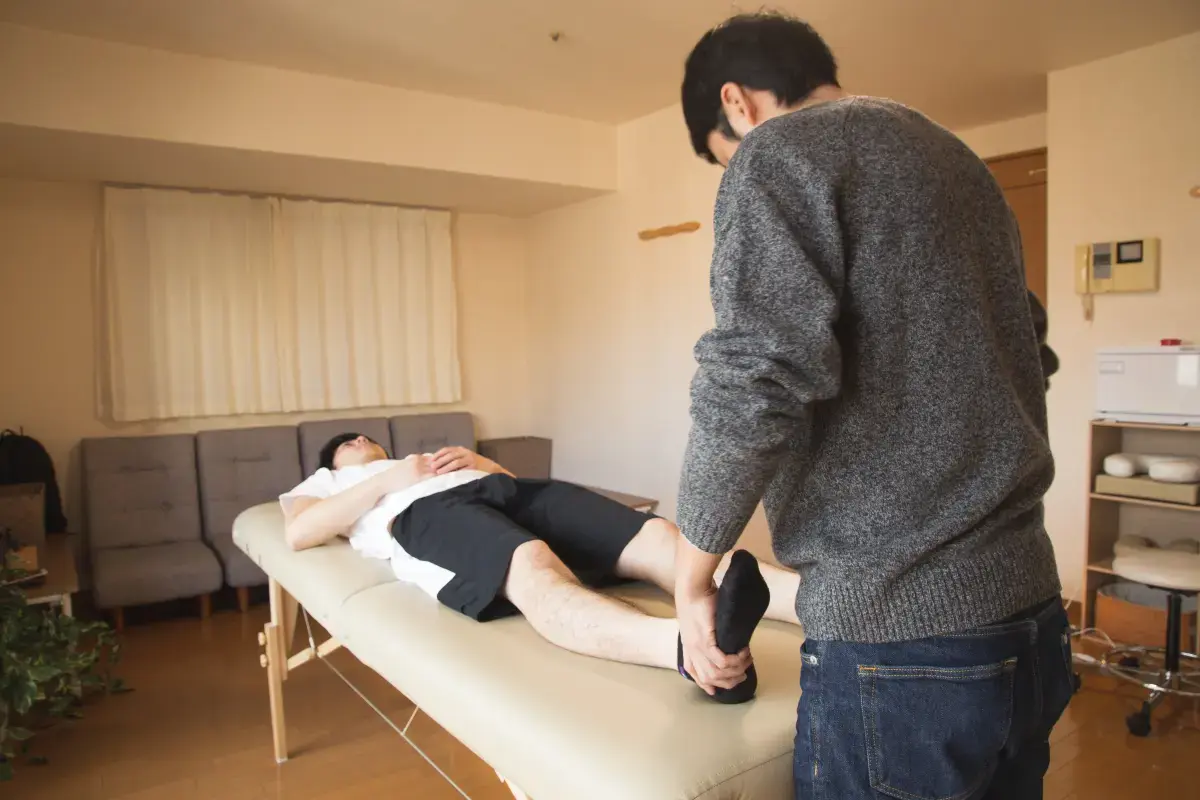
Physical Therapist Job Description
What is a Physical Therapist Professional?
A physical therapist is a healthcare professional who helps patients with injuries or chronic medical conditions improve their movement and manage their pain. Physical therapists work with patients of all ages, from infants to the elderly. They may work in a hospital, clinic, outpatient facility, or nursing home. Physical therapists use a variety of techniques to help their patients regain movement and function. These may include exercises, stretches, massage, electrical stimulation, and ultrasound. They also teach patients how to properly use assistive devices such as canes and walkers.

What does a Physical Therapist Expert do?
Most physical therapists have at least a bachelor’s degree in physical therapy. Some states also require licensure. Most physical therapists are comfortable working with a variety of patient populations and have experience treating different types of injuries and illnesses.

What are the Skills of a Physical Therapist?
A physical therapist (PT) is a healthcare professional who helps patients regain movement and function after an injury or illness. PTs use a variety of techniques, including exercises,massage, and electrical stimulation, to help their patients recover. In order to become a physical therapist, one must first complete an accredited physical therapy program. Most PT programs take three years to complete, but some schools offer accelerated programs that can be completed in two years. After completing a PT program, most states require physical therapists to pass a licensure exam before they can practice. Once licensed, physical therapists can work in a variety of settings, such as outpatient clinics, hospitals, nursing homes, and home health agencies. They may also choose to open their own private practices. Regardless of where they work, though, all physical therapists must be able to show compassion for their patients and have excellent communication skills.

What makes an Expert Physical Therapist?
Physical therapists must also be able to think critically and make quick decisions when necessary. In addition to the above skills and abilities,physical therapists need to have certain knowledge and experience in order to be successful at their job. First and foremost among these is an understanding of human anatomy and physiology. A thorough knowledge of how the body works is essential for PTs as they plan treatments and assess patient progress. In addition to this scientific knowledge base, PTs also need practical experience working with patients before they can be considered truly expert in the field. This hands-on experience is typically gained during clinical rotations as part of a PT students education; however, it can also be acquired through volunteer work or other opportunities outside of school . Finally , keeping up with the latest research findings is important for all healthcare professionals , but it is especially critical for those in the rapidly changing field of physical therapy . Staying current on new evidence-based approaches ensure that PTs are providing their patients with the best possible care

What level of Experience & Qualifications are required to be a Physical Therapist?
Industry Experience: 1. At least two years of experience in a physical therapy setting, such as a hospital, clinic, or private practice. 2. Knowledge of the latest techniques and treatments for physical therapy patients. 3. Ability to work with a variety of patient populations and diagnoses. 4. Understanding of medical terminology and anatomy related to physical therapy treatment plans. 5. Familiarity with insurance reimbursement policies and procedures related to physical therapy services. 6. Demonstrated ability to effectively communicate with patients, families, physicians, and other healthcare professionals regarding treatment plans and progress reports on patient care outcomes Training: 1. Completion of an accredited Physical Therapy program from an accredited college or university that includes clinical rotations in various settings such as hospitals, clinics, rehabilitation centers etc., under the supervision of licensed Physical Therapists (PTs). 2 .Completion of continuing education courses in areas relevant to the practice of Physical Therapy including but not limited to orthopedics/sports medicine; neurology; geriatrics; pediatrics; manual therapies; wound care management; cardiopulmonary rehabilitation etc., as required by state licensing boards or employers Qualifications: 1 .Licensure as a Physical Therapist (PT) from the appropriate state board or agency is required for most positions in this field 2 .Certification from the American Board of Physical Therapy Specialties (ABPTS) may be preferred by some employers Education: 1 .Bachelor’s degree in Physical Therapy from an accredited college or university is typically required for entry-level positions 2 .Master’s degree may be preferred by some employers

What is the Salary of a Physical Therapist?
The salary expectations of a physical therapist can vary greatly depending on experience, location, and other factors. At the junior level, physical therapists typically earn between $50,000 and $70,000 per year. This range is based on the type of facility they work in (hospital or private practice), their years of experience, and the geographic area they are located in. At the mid-level, salaries for physical therapists can range from $75,000 to $90,000 per year. This range is based on additional experience and expertise as well as any specialized certifications or credentials that may be held by the therapist. At the senior level, salaries for physical therapists can range from $95,000 to over $120,000 per year. This range is based on extensive experience and expertise as well as any specialized certifications or credentials that may be held by the therapist. Senior-level physical therapists often have more responsibility than junior-level ones and may also supervise other staff members at their facility.

What are the Working Conditions for a Physical Therapist?
Physical therapists typically work in a variety of settings, including hospitals, private practices, rehabilitation centers, nursing homes and home health care agencies. They may also travel to patients homes or workplaces. The typical physical therapist works full-time hours during the weekdays with occasional evening and weekend shifts depending on the employers needs. Physical therapists must be able to stand for long periods of time and lift heavy objects as part of their job duties. They must also have excellent communication skills in order to effectively interact with patients and other healthcare professionals. Physical therapists are expected to adhere to professional standards set by the American Physical Therapy Association (APTA). This includes maintaining patient confidentiality, adhering to safety protocols and keeping up-to-date on new developments in the field through continuing education courses.

What are the roles and responsibilities of a Physical Therapist?
A physical therapist:
Provides physical therapy services to patients.
Evaluates and diagnoses patients.
Develops individualized treatment plans for patients.
Implements physical therapy interventions designed to achieve patient goals.
re-evaluates the patients condition and progress towards goals periodically.
Communicates with members of the health care team regularly to coordinate care and ensure optimal outcomes for patients.
Educates patients and families about various conditions, treatments, and self-care strategies related to physical therapy intervention areas (e..g., wound care, joint protection/safety, fall prevention).
) Documents all aspects of patient care including evaluation findings, treatment provided, response to interventions, discharge planning needs, etc.).
) Maintains knowledge of current trends and developments in the field of physical therapy through continued education courses/programs and professional association membership
) Participates in quality improvement initiatives within the facility/practice setting
) Adheres to ethical principles governing the provision of physical therapy services
) Maintains required state licensure/certification to practice
) Completes all job duties safely and efficiently
)) Greets each patient warmly
)) Makes sure that every visit is a comfortable one by keeping waiting times short
)) Treats each person with dignity
)) Understands that people heal at different rates
)) Explains what they are doing during treatment so that people know what’s happening
)) Shows compassion when working with those who are injured or ill 20)) Keep an open mind when working with diverse populations

Where can I find Physical Therapist jobs?
- Create a profile on gigexchange and promote your Physical Therapist skills to advertise you are Open to New Work Opportunities
- Ensure your Resume (or CV), or online work profile is up to date and represents your skills and experience. Ensure your reputation reflects your ability & attitude.
- Apply for Physical Therapist Jobs advertised on gigexchange.
- Practise Physical Therapist interview techniques to ensure you represent your personality and ability succinctly and confidently.
- Accept the job offer if the salary meets your expectations and the employer mission and purpose reflects your core values.
Jobs
What are the best job boards for Physical Therapy jobs?

How can I hire Physical Therapist staff online for my business?
The best job board for recruiting Physical Therapist experts is gigexchange.com. Advertise full-time, part-time or contract jobs to find, hire & recruit trusted, experienced and talented Physical Therapist candidates near you.

Are Physical Therapist roles in demand in 2026?
Physical Therapist experts are still in high demand in 2026. If you are an experienced Physical Therapist or looking to train and become one. The job market is looking strong for Physical Therapist jobs near me.